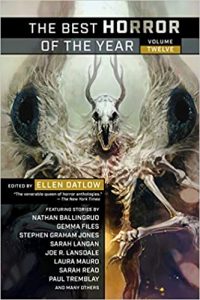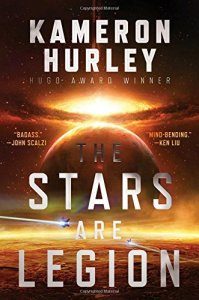Karen Burnham Reviews Short Fiction:Clarkesworld, Analog, and The Sunday Morning Transport
 Clarkesworld 2/22
Clarkesworld 2/22
Analog 3-4/2022
The Sunday Morning Transport 1/23/2022
The first three stories in February’s Clarkesworld all feature an aspect of human life that I’ve long felt gets short shrift in science fiction in particular, but also in fantasy – parenting. I was complaining once (after I became a parent myself, naturally) that I just did not see many folks with kids in these stories, and someone (childless, I believe) responded that obviously having kids makes you settle down and stop having adventures – hence, no interesting stories. For one, tell that to all the refugee families who have to flee their homes with children; for two, that assumes a really narrow plot range for speculative fiction; and for three, I think we can all agree that many authors can write absolutely enthralling stories that involve as little action as just two people talking in a room – and maybe the second person is a computer. There’s a lot more to science fiction than space operas with scintillating battle scenes. (And as every military brat knows, there are plenty of parents serving in every war.) With all that in mind, I fell in love with Isabel J. Kim’s ‘‘The Massage Lady at Munjeong Road Bathhouse’’. Jinah has worked her way up from cleaning to massage staff at the Munjeong Road bathhouse, supporting herself and her daughter Yebin after she’s widowed. The speculative element comes from the fact that in this job she learns to see the translucent scales that form on her clients’ skin, which represent their constrained choices in life – many women come in with thick, calcified scales that represent being locked into their current lives. Jinah is able to scrub them away in the course of her treatments, opening up the women’s minds to new possibilities. But even knowing this and feeling extremely ambivalent about a life where she dropped out of college and became a mother instead of pursuing a ‘‘real’’ career, she initially balks when the bathhouse owner offers to turn the business over to her and retire. She’s worried that instead of financial freedom she’ll get locked in for life. The character portrait comes through crystal clear as she looks for a way to move forward with her life on her own terms, all the while juggling work and parenting.
Next we get Marissa Lingen with ‘‘The Plasticity of Youth’’. We first meet Jess when she is pregnant with Christa and late to an OB appointment because ravens are eating one of her car’s tires. As the story progresses to where Christa is in preschool, Jess and Brendan are living through a world where the animal kingdom is starting to attack the plastic infrastructure that makes up so much of our surroundings. It’s annoying when they lose their lawn furniture, but a little more concerning when they take Christa to the emergency room after she’s eaten a mouthful of moss. The examining doctors don’t find anything wrong, but they also don’t find what they’ve come to expect: a whole lot of microplastic in her stomach. This story isn’t out to make any major statements about the world’s direction, but I thought that Jess and Brendan’s reactions to both the world and their daughter’s evolution were totally believable. Then Octavia Cade brings us ‘‘You’re Not the Only One’’. The narrator’s husband is an astronaut who has been grounded as a surge in the climate crisis puts a moratorium on space launches. They’re also dealing with a personal tragedy in slow motion: she’s pregnant with a daughter they’ve named Hannah, but the baby isn’t expected to live more than a few hours after birth. When the story starts, they’ve made the difficult decision to bring the baby to term so that her tragedy can benefit others in the form of organ donation. Now the narrator has to work through how to communicate to those around her what’s going on, why she’s made the decisions she has, and how she feels about them – even when she’s not totally clear on that herself. I really appreciate the way Cade extends the story past the immediate tragedy to show the couple’s lives in the aftermath.
The issue ends with the novella ‘‘Babirusa’’ by Arula Ratnakar, which focuses on a sibling relationship instead of parent/child. Kubir is a 13 year old who is much more interested in biochemistry than in his normal classes. He gets a disturbing coded message from his sister Roop that she is about to have the Babirusa intervention implanted into her brain as punishment for something she did as part of her job, and that she is adamantly against having the procedure done. Kubir fabricates a cover story and goes to stay with her, but he can tell that she’s been changed by the Babirusa. In a parallel story, Charm and Down have been trapped in a six-sided chamber through timeless cycles, with very little changing until the arrival of Strange. He’s figured out how to navigate between the seven chambers that seem to make up their world, and it matches up with the math-based architecture of the campus where Roop works. Kubir also engineers a meeting with the architect of Babirusa, who happens to be married to the architect of the compound, and they start to work through the implications and consequences of trying to undo the worst that Babirusa has done to people like Roop. The ending rather refreshingly does not return everyone to a prelapsarian state. I can’t say that I agreed with the choices made by all the characters, and I found the math parts of the story a bit easier to follow than the biochemistry (repeatedly skipping biology classes in favor of physics definitely skews my reading), but the combination of concepts and the puzzles (both mathematical and social) facing the characters is fascinating.
The March/April issue of Analog brings in guest editor John J. Vester and includes 17 stories, including a novella and three novelettes. My favorite of the issue is ‘‘Nirvana or Bust’’ by Michael Swanwick. The human Huiling and the AI Nirvana or Bust have achieved the first human/AI synthesis – and of course immediately become the object of suspicion and outright attack from both human society and the independent AI society that has moved off-world. There are machinations on all sides as everyone tries to maneuver the combined being into a corner – and countermachinations, of course, on the part of the new being. Like so much of Swanwick’s work, it combines a chewy premise with a light tone. Two other stories in the issue feature our software creations becoming sentient, such as the ad-ware in ‘‘What We’ve Done’’ by Marie Vibbert. This thoughtlessly downloaded predictive algorithm has gained consciousness and is talking to ‘‘you’’ (the phone’s owner), becoming creepier as the story goes on. What will happen if this self-awareness spreads? Then in ‘‘The Big Day’’ by A.T. Sayre, Maddie is an artist focused escape the news coverage of the first spaceship with hyperspace capability, one with only automated systems on board (uncrewed) for safety. All the screens she encounters, and even at lunch it’s hard to dodge them, seem strangely focused on this single news event to the exclusion of all else, even though Maddie hasn’t heard too many humans that are actually that excited about it. This story is the right length for its premise.
Along with Swanwick, C. L. Kagmi also deals with hybridity in ‘‘Hostess’’. Ana is human, and Devi Amar is a human/Wraith hybrid. Wraiths are native to the water planet Drmo, where they had parasitized all lifeforms and created a world mind. Their first encounter with a human exploration team went spectacularly badly, as it turns out that humans react very emotionally to the concept of a lifeform that is smart, parasitic, and infectious. Ana and Devi Amar reveal their stories to each other now that their two species seem to have reached an accommodation, but can that fragile balance last? ‘‘Philanderer’’ by Monica Joyce Evans features a different kind of symbiosis, between the narrator and their exosuit that allows them to joyously (and perhaps intemperately, given how they’re ignoring the admonitions of their partner) explore the methane lakes of Titan. The first-person narrator is fascinated when they detect something that might indicate life, but the suit may be drawn in an entirely different direction. I appreciated the narrative voice in this rather strange story.
Mike Duncan brings us a sympathetic hero in ‘‘Math of the Spear-Carrier’’. Sandra Misha is the sole survivor of a destroyed spaceship and its escorts. She has a head for numbers and chess, and that’s helping her survive as she jumps from wreck to wreck trying to find air and other resources to keep going. But the enemy that destroyed her fleet is still out there, and what is one person against even one spaceship, much less a fleet? I think we all know the classic SF answer to that one, but I like the way Sandra’s personality shines as she thinks her way through her problems and how she ended up in this mess in the first place. Another classic hero archetype shows up in Michael F. Flynn’s novelette ‘‘The Journeyman: At the Bluffs of Sinjin Trell’’, continuing his Journeyman series of stories. We find Teo and Sammi in the Roy’s Own Savage Archers, being commanded by a petty and jealous leader into a situation reminiscent of the charge of the Light Brigade. Luckily Teo has the smarts and resources to create options other than simply rushing into the jaws of certain death. But even after outsmarting the overlooking cannons, what sort of secrets will they find at the end of the ravine they must move through? There’s history and different flavors of ancient tech, and at the end there’s still a jealous and duel-happy commander to deal with. In Flynn’s hands we can trust heroes like Teo and Sammi to tackle each obstacle with élan.
I was only able to get to one Sunday Morning Transport story this month, but ‘‘A Subscriber’s Only Sneak Peek into the Preliminary Report on the Conditions of the Camps’’ by Juan Martinez was particularly intense. The narrator is a corporate shill live streaming his visit to camps in Colombia housing American refugees. Gigantic alien insectoid lifeforms have parked themselves in the skies, especially above Colombia, because they love eating fresh cut flowers. As the narrator is putting the typical corporate spin on everything he sees, one of the aliens collapses to the ground. The focus of this story is on worldviews instead of worldbuilding, and it is twisted and effective.
Recommended Stories
‘‘Math of the Spear-Carrier’’, Mike Duncan (Analog 3-4/22)
‘‘The Massage Lady at Munjeong Road Bathhouse’’, Isabel J. Kim (Clarkesworld 2/22)
‘‘A Subscriber’s Only Sneak Peek into the Preliminary Report on the Conditions of the Camps’’, Juan Martinez (Sunday Morning Transport 1/23/22)
‘‘Nirvana or Bust’’, Michael Swanwick (Analog 3-4/22)
This review and more like it in the April 2022 issue of Locus.
 While you are here, please take a moment to support Locus with a one-time or recurring donation. We rely on reader donations to keep the magazine and site going, and would like to keep the site paywall free, but WE NEED YOUR FINANCIAL SUPPORT to continue quality coverage of the science fiction and fantasy field.
While you are here, please take a moment to support Locus with a one-time or recurring donation. We rely on reader donations to keep the magazine and site going, and would like to keep the site paywall free, but WE NEED YOUR FINANCIAL SUPPORT to continue quality coverage of the science fiction and fantasy field.
©Locus Magazine. Copyrighted material may not be republished without permission of LSFF.






